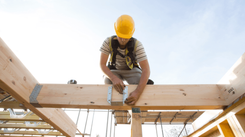How Much Does It Cost To Build A House In 2025?


by Tyler Forte
Building a home may be for you if you’ve been searching through real estate listings lately and feel underwhelmed by the selection. Building a home allows you to get what you want and you don’t have to do any work on your house once you move in. There are new houses at every price point. At Felix, we help homeowners match up with the perfect builder so they can create their dream home. We take the time to vet builders, so you enter every new build experience with the correct information.
We’ll walk you through the construction costs associated with building a new home so that you can see if it’s right for you.
Key Takeaways
- The more custom a house is, the more it will cost. Try purchasing a spec or tract home if you’re looking to save money.
- On average, you will find the cheapest houses in the Midwest and the South.
- Land, labor, and materials are a new build’s most significant expenses.
- Upgrades can really derail your budget. Consult a Realtor on upgrades that enhance the value of your house.
House Cost By Type
There’s a lot that goes into building a home. But the type of house can be a significant predictor of price. Some types of homes just cost more to build. We’ll break down the price ranges below.
How much does it cost to build a custom house?
It costs between $300 to $500 per square foot to build a custom house. Your cost per square foot will be highest for a custom house. A custom house is just like the name implies; it’s completely custom to your specifications. You choose every square inch of what goes into your house. You also assemble a team that includes an architect, builder, and general contractor.
If the idea of examining every detail sounds like your worst nightmare, then a custom house may not be for you. You will also have to consider your living situation and expenses with a custom house because it has the longest build process with an average build time of 9 to 18 months.
How much does it cost to build a semi-custom house?
Semi-custom houses can range between $100 to $500 per square foot, so you’re typically getting a better deal than a full-out custom house. A semi-custom home allows you to choose any finishes that make your house feel customized, but you’re not scouring the internet for things like door knobs. You also can make minor modifications to the floor plan and house plans.
How much does it cost to build a spec house?
A spec home is like a semi-custom house, but you didn’t make any of the design decisions. This is why it’s priced about the same as a semi-custom house at $100 to $500 per square foot. In many cases, spec homes are already partially built when you tour them, so often you can move in quickly. This can lead to additional savings because you don’t have to move into a rental or rent back your existing house. It’s a great way to get into a brand new house fast.
How much does it cost to build a tract home?
A tract home is an affordable option for someone looking to buy a new home at $60 - $115 per square foot. You don’t get to customize a tract home. The savings (and name) come from builders buying large tracts of land. They build homes in bulk that have a cookie-cutter feel to them. But tract homes are an affordable option, and you can move in fast.
How much does it cost to build a townhome or condo?
Townhomes and condos vary widely in cost. Some are multi-million dollar properties in the heart of a city, and others are more affordable outside of town. It depends on location. Your upkeep and maintenance are likely lower than a single-family home. You are not maintaining a large yard, and with less outdoor space, you are bound to save a lot of time. Many condo and townhome communities also maintain the exterior of the home keeping maintenance to a bare minimum. If this sounds appealing to you, a townhome or condo may be the right fit.
How much does it cost to renovate an existing house?
When you renovate an existing house, expect to pay between $15,000 and $200,000 on top of the cost of the house. There is also uncertainty when you go into any home renovation project because you don’t know what exists behind walls until you start tearing them down.
Average Cost Per Square Foot To Build A House By Region

In 2022, the average sales price for a house in the U.S. reached $507,800. But buying a house in the U.S. varies widely by region. Here’s a breakdown of the average cost by region:
- Northeast: $797,400
- Midwest: $430,500
- South: $440,300
- West: $616,300
So as you can see, you’ll pay more if you’re trying to live in a state on the East or West coasts.
What Are The Most Affordable Areas Of The Country To Build A House?
The most affordable areas of the country are in the South and Midwest. Let’s dive into the areas with lowest median home values:
- West Virginia: $99,000
- Oklahoma: $125,400
- Arkansas: $125,400
- Mississippi: $130,200
- Alabama: $134,000
- Kansas: $141,500
- Ohio: $142,600
- Iowa: $146,500
- Louisiana: $147,600
- Kentucky: $148,400
So there are plenty of areas in the country where you can find an affordable brand-new house.
What Are The Least Affordable Areas Of The Country To Build A House?
The most expensive areas to buy and build your own house tend to be in the East and West coast states. Here are the top ten states for the highest median home prices:
- Hawaii: $619,000
- District of Columbia (Washington D.C.): $567,800
- California: $550,000
- Massachusetts: $408,100
- Washington: $393,800
- Colorado: $381,300
- Utah: $351,100
- Oregon: $350,600
- New Jersey: $329,000
- Alaska: $326,000
Cost Concerns For Building A House

There are a lot of factors that can affect the price of a house. That’s why you see so much variation throughout the country. Here are some common areas that affect overall costs.
Materials
Builders use materials to construct your new home, comprising 30 - 50% of the total cost. With supply chain issues and shortages, you’ll likely experience increased material costs. Most famously, the housing industry has been struggling with a lumber shortage. (Fortunately, that seems to be leveling off now.) But there are other shortages on the horizon– steel (up 105.6%) and concrete (up 12%) in the last year.
Homebuyers can run up a price tag if they choose too many high-end finishes. Be sure to consult your Realtor on which upgrades help the value of your house.
Labor
One of the reasons that costs are lower in the South and Midwest is that labor costs tend to be lower. Construction labor costs vary throughout the country.
One way to keep labor costs under control is to hire a reputable builder with experience in hiring and managing contractors so your build stays on time and on budget. Felix can help you find the right builder for the job. We vet hundreds of builders in local markets to find the right one for you.
Other factors
Choose the right type of house when building. Chances are, you do not need a fully custom house. You can get a level of customization from semi-custom or even a spec house. Consider your options before committing. You can have a unique brand-new home that fits your budget.
What’s The Cost Breakdown Of Building A House In 2025?
There’s a lot that goes into building a house. Let’s break down the National Association of Home Builders (NAHB) stats to understand where each dollar goes.
Lot
The average cost of a finished lot is 18.5% of your total price and is about $89,540. The term finished lot refers to land that is ready for building. A lot goes into completing a lot, including clearing the land of trees, grading, fixing drainage issues, and adding access to utilities. The lot is already finished when you buy a lot in a subdivision.
You can buy a piece of land anywhere, but often these lots are not finished. So the sticker price on the land will be much lower, but you will have to pay money to get it ready for your build. You don’t always know what the cost of site work will be until you start doing the grading, hooking up utilities, and hooking up septic or sewer.
Plans, permits, and other fees
There are many hurdles you need to clear when you’re finalizing plans, permits, and other fees. These fees can hurt because you have to pay these before you even start construction. Let’s break down the national averages for these areas.
- The average cost of building permit fees is $5,086. Each municipality will be different, and some areas of the country charge a lot more.
- It’s not abnormal for builders to pass on any impact fees to you—these average $3,865. Local governments charge impact fees to cover the cost of growth and put it towards infrastructure like roads and schools.
- You will need water and sewer inspections, which come in at $4,319.
- If you’re building a custom house, this is the time you pay the architect and engineer. This fee is approximately $4,335.
These fees total $18,323. So a lot goes into your house before you even start on the house.
Site work and foundation
You can expect to pay $34,850 for site work and a foundation. The builder must get this done correctly, and it’s worth every penny. Your builder will use machinery to ready the land for the foundation. Sitework also includes necessary grading so that your lot has adequate drainage. The price tag can add up if the elevation of your house is challenging and you need retaining walls.
You can also expect your utilities like sewer, water, and electricity to get hooked up. You may not be close enough to a sewer system and may have to go the septic route.
Septic tanks often cost more than hooking into the local sewer system. You often need to jump through more hoops for a septic tank. This includes getting a percolation (perc) test to determine the soil absorption rate. You will need to obtain a permit for your septic tank. You don’t want to run into issues with this after you start construction, so we recommend doing your perc test before buying the land.
Then your builder lays the foundation of your home. Most homes will have a crawlspace or slab foundation. You will typically pay a premium for a basement foundation but the additional square footage could be finished into living space in the future.
Framing
Framing involves the lumber that will form your house’s skeleton. The average building cost of this is $51,589. Lumber prices are high now, and framing is about 17% of your projected budget. This number goes up if your house requires roof trusses (triangular roofs) or if it requires metal in the framing.
Major systems
The major systems in your new home include plumbing, electrical, and the HVAC system. Your builder will hire subcontractors like electricians and plumbers. These come in at $43,668. You’re not paying for plumbing and electrical fixtures. Builders factor these into your interior finishes cost. You can choose certain upgrades here, like a tankless water heater that will increase your price.
Interior finishes
Interior finishes can quickly add up when you are customizing your new build. Work with your Realtor to prioritize the right upgrades here. With such a wide variability in cost, the NAHB compiled some typical averages:
- Insulation: $5,184
- Drywall: $10,634
- Flooring: $11,998
- Interior trims, doors, and mirrors: $10,605
- Cabinets, countertops: $13,540
- Appliances: $4,710
- Painting: $8,254
- Lighting: $3,437
- Plumbing fixtures: $4,108
- Fireplace: $1,867
- Other: $923
These are the bulk of the costs when you’re building a home, and you can expect to pay a total of $75,259 on interior finishes.
Exterior finishes
The average price of exterior finishes is $41,690. You are paying for the labor and material costs that cover the exterior walls of your house. This includes materials like siding, stone, and brick. The cost of these upgrades will vary. Exterior finishes include windows and doors as well.
You should consider upgrades here to enjoy savings over time through energy efficiency. We recommend adding additional windows as well to allow the natural light to enter the interior of the home.
Landscaping and other final additions
You will pay about $20,116 here. The breakdown includes:
- Landscaping: $6,506
- Outdoor structures like decks, patios, and porches: $3,547
- Driveway: $6,674
- Cleanup: $2,988

How To Finance A New Construction House
There’s not much difference in the loan application process when buying a new construction house. There are many loan options, and shopping around for the mortgage type and rate that is right for you is crucial. Here are your typical mortgage options to talk over with your preferred lender.
- Conventional loan: This is the most common mortgage for someone with good credit. You can get a fixed or a variable mortgage rate under this type of loan. The minimum down payment for a conventional loan is only 3%. Keep in mind that you will have to pay Private Mortgage Insurance (PMI) if your downpayment is less than 20%.
- Construction loan: A construction loan gives you more flexibility while building your house. Many people get a new home construction loan and then refinance into a different loan when they close. This is a popular option for people who are looking to build a custom or semi-custom home.
- VA/ FHA/ USDA loan: These government-backed loans have a unique qualification process. They are good if your credit is not strong or you don’t have enough for a down payment. A VA loan for example does not require a downpayment.
- Jumbo loans: A jumbo loan can help you buy an expensive house. These are home loans that are popular amongst buyers of homes that will cost over $1 million. They typically come with a higher interest rate and a larger downpayment requirement. Check with a lender or your Realtor to see if you will need to use a jumbo loan for your home purchase.
- Land loan: You can use a land loan if you plan to purchase a plot of land and then build a house later. Land loans may have a higher interest rate and required downpayment.
- Cash: In many cases, this is the most straightforward method to purchase a new home.
Average Closing Costs For A New Construction Home
You can expect to pay between 3% - 6% of the total price of your home in closing costs. So on a $500,000 house, you can expect to pay between $15,000 and $30,000 in closing costs.
Here’s a breakdown of what you can expect to pay with closing costs:
- City and county real estate taxes (prorated): You will typically pay up to 2-3 months of prorated property taxes. Property taxes vary widely across the country, so consult the rates for city and county taxes in your area.
- Appraisal fee: You must get a home appraisal before closing your loan. The mortgage company wants to know you are making a wise investment. You can expect to pay $300 - $400 on an appraisal.
- Homeowner's insurance premium: Most mortgage companies require that you insure your home. This varies depending on the house. Be sure to shop around for the policy because this is an ongoing cost like your mortgage.
- Title insurance: The fee for title insurance varies. But you will need to pay for this because it protects the lender if there is an issue with your home’s title. (In cases where more than one party claims your title.)
- Closing and escrow fee: Escrow fees are paid to the title company. The title company sets up the paperwork for closing and the escrow account. You can expect to pay 1% of the purchase price on this fee.
- HOA fees: HOA fees vary from neighborhood to neighborhood. But you may have to prepay HOA fees before closing on your house.
You can save considerably on closing costs using the builder’s preferred lender. They will often provide a credit towards your closing costs.
Another way to save on closing costs is by using Felix as your buyer's agent. We'll lower the commission we charge the builder so that you can save on the sales price! Read more about our Buyer Savings Program.
Will The Builder Negotiate On Price?
A builder typically does not negotiate on the sticker price, but they will negotiate in other areas of your sale. You can negotiate a credit towards your closing costs, builder upgrades, extended warranties, and more for your new build. Read more about negotiating with the builder here.
What Should You Do If You Start To Notice Your Build Going Over Budget?
There are many reasons that a new build can go over budget, so there are a few things you can do to protect your budget. First, make sure you negotiate a price escalation clause into your purchase agreement. This will save you from the builder increasing the price of your house due to material and labor price increases. You should also have a way to check in with the project manager to ensure everything stays on budget. Your Realtor can be a great resource when it comes to managing your build-out process.
Oftentimes, however, price increases start to get out of control when homebuyers go haywire with upgrades. Work with your Realtor to determine which upgrades you should choose from the builder. You may be better off closing on the home and upgrading certain aspects yourself such as adding blinds, ceiling fans, and more premium light fixtures.
Where Should You Splurge When Building A House?

It’s best to consult a Realtor who has experience with new builds here. A Realtor will know where you will get the best return on resale. Generally speaking, we recommend choosing upgrades in to kitchen such as quartz or granite countertops. You also can’t go wrong swapping out carpet for hardwood or premium vinyl flooring.
Build A Better House With Felix
Sign up with Felix to start your new construction home journey. We will alert you when a builder in your desired area is building a house to your specifications. Felix will manage the process from start to finish. Get started today with Felix!
About Felix Homes
Felix Homes is where five-star service meets low commissions! To date, we've saved our clients $1,610,738 in commission fees and have earned 120 five-star reviews on Google!
How are we able to offer five-star service AND lower commission fees? It's simple:
- We're an independently owned brokerage – not a franchise which allows us to keep more of the commission we earn.
- By offering a lower commission, more folks want to work with us which means we close more deals. By closing more deals, we can pass more savings along to our customers!
Still not convinced? Read all about our low-commission mission here.
If you have any questions about the state of the market or the home buying/selling process, please feel free to contact us at contact@felixhomes.com or 615-354-5731.




